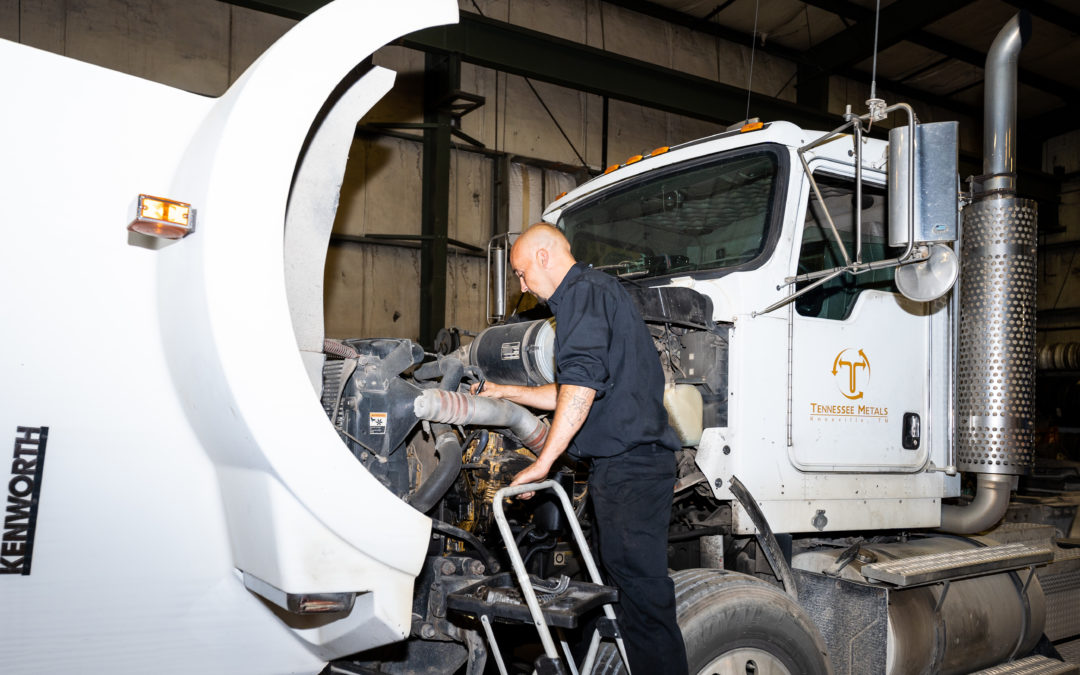When a diesel engine overheats big problems and expensive repair bills are on the horizon if the overheating issues aren’t fixed right away. More significant problems that can arise from your diesel engine overheating include broken head gaskets, camshaft swelling, damage to bearing and crankshaft, damage to the radiator core, and even cracked cylinder heads. For truck drivers, an overheating engine can also cause costly tow bills and delayed deliveries if you break down. For drivers, there is a specific list of causes of diesel engine overheating and ways to prevent overheating while out on the road.
Primary Reason for Diesel Engine Overheating
The primary reason for diesel engine overheating is a lack of coolant or antifreeze. Furthermore, the most common indication that your engine is getting too hot is the moving of the engine temperature gauge into the red zone. Duh, right? Most of the time when a diesel engine overheats, however, the coolant tank will often contain coolants. While your diesel engine.
in fact, may have ample coolant available, when something else goes wrong with other engine components it can prevent coolant from doing its job.
Common Diesel Engine Overheating Issues
Mixing New and Used Coolant
While proper maintenance of a diesel engine involves checking your coolant to ensure it is the appropriate color and free of debris or dirt, if new coolant is mixed with old it can lead to overheating. This occurs when two different coolants have different boiling points. Avoid mixing different coolants if they aren’t similar colors. Instead, you may need to flush your cooling system and refill with brand new fluid.
Broken Radiator Hose
So, you have coolant but still experiencing overheating? The first thing to check in diagnosing the root cause is to check your radiator hose. If it breaks or collapses, fluid won’t be able to get to and from the engine correctly causing overheating. A diesel mechanic should be able to spot a broken radiator hose and replace it for you rather quickly.
Coolant Fluid Leaks
If your coolant fluid level is low or you see an excessive amount of bubbles in the coolant in the tank, it’s most likely that you have a coolant leak. A common cause of coolant loss is due to cracks or damage to your gasket. If you’re over the road and cannot locate a diesel technician to repair the leaks right away, you may want to grab a few extra bottles of coolant to last you until you can make it to a mechanic.
Failing Water Pump
Generally, water pumps for diesel engines are expected to last for the entire life of the engine, and so there’s no preventative maintenance associated with them. However, if a water pump’s seal fails, it can cause your rig to come to an immediate halt. Checking for signs of leaking or corrosion around the water pump can help diagnose this rare cause for engine overheating.
Broken Cooling Fan
Another critical component keeping your diesel engine cool is the cooling fan; and if it quits working correctly, your engine’s temperature is likely to sky-rocket quickly. Because cooling fans are electric, it’s likely an electrical or wiring problem; however, a cooling fan not working could also be caused by a fuse or temperature sensor. If your cooling fan is not running correctly, it should be seen by a diesel technician immediately.
Faulty Thermostat
On most trucks, your thermostat is a temperature control valve that is located at the engine coolant outlet. If your diesel engine’s thermostat is damaged or not working correctly, your engine won’t be able to regulate temperature or engage coolant properly. Diesel technicians may use an infrared thermometer (also called a pyrometer) or a scan tool to test the thermostat to ensure that it is getting a correct reading.
Faulty Sending Unit
The thermostat in diesel engines works in unison with an electronic sending unit. If the sending unit malfunctions, it will send incorrect information to the thermostat rendering it ineffective. Sending unit issues can also be diagnosed by examining the wiring or by running a scan tool.
Clogged Diesel Injectors
Another common cause of diesel engine overheating issue is a clogged diesel injector. When this occurs, the injector system does not release fuel properly, causing the engine to work extra hard and subsequently overheat. Clogged, dirty, leaky or faulty injectors can also cause starting issues, a poor idle, and increased fuel consumption, so it’s imperative to check them often for clogs or leaks. Because of all these additional symptoms, it is likely you’ll know if bad injectors are causing your overheating problem. Make sure to tell your mechanic if you smell a strong fuel order or have been experiencing engine misfires as this will help them diagnose your problem.
Fix your Diesel Engine Overheating Issues
As a truck driver, you are always monitoring the condition of your rig. While modern electronic diesel engines automatically reduce power in the event of a coolant loss, this is a feature to help get you to the next rest area. A spiking temperature gauge should be a cause to immediately pull over to a safe area and shut down your engine. By having a Certified Diesel Technician perform regular preventative maintenance on your diesel engine, many of the causes of diesel engine overheating can be caught and fixed before they become more significant problems on the interstate.
Contact Certified Diesel Solutions today if your engine’s temperature gauge is redlining or to ensure that your cooling system is running at optimal condition. Making an appointment is as easy as sending us an online request for service or by phone at (865) 964-6598.

